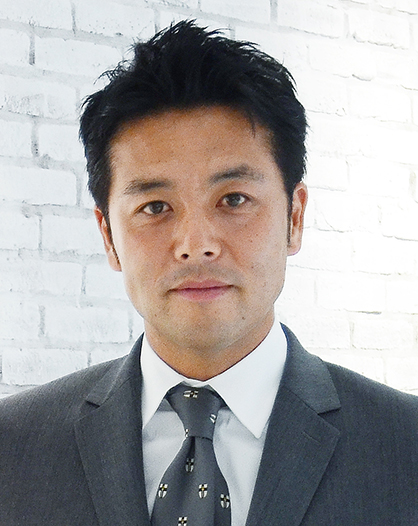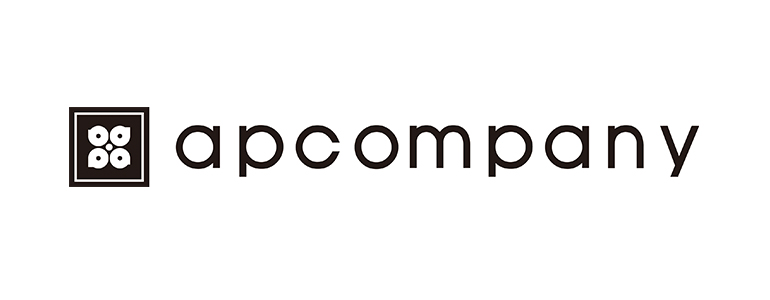| AP COMPANY (3175) |
|
||||||||
Company |
AP COMPANY CO., LTD. |
||
Code No. |
3175 |
||
Exchange |
Tokyo Stock Exchange 1st Section |
||
Industry |
Retail |
||
President |
Hisashi Yoneyama |
||
HQ Address |
KDX Shiba-Daimon Building, Shibadaimon 2-10-12, Minato-ku, Tokyo |
||
Year-end |
March end |
||
Home Page |
|||
* Share price as of close on November 16, 2015.
|
||||||||||||||||||||||||
|
|
* Estimates are those of the Company.
|
|
| Key Points |
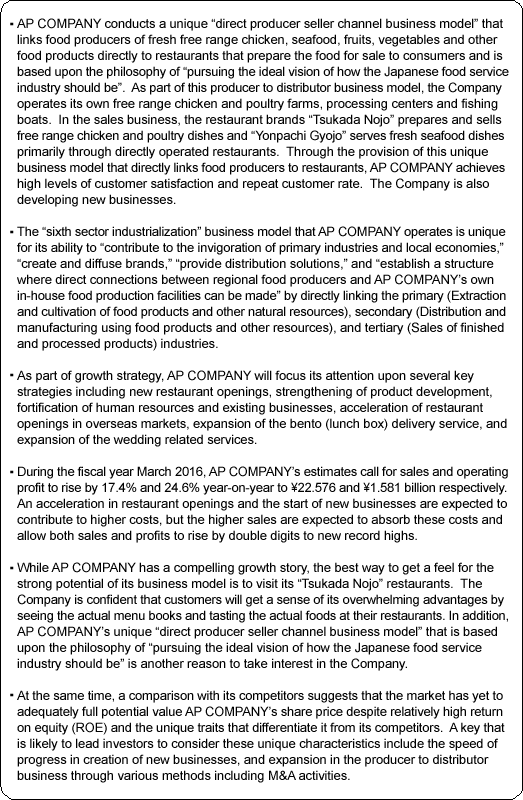 |
| Company Overview |
|
<Corporate History>
President Hisashi Yoneyama established AP COMPANY as a private company for the production of restaurants in October 2001 and thereafter rapidly expanded the business. At the time, Mr. Yoneyama realized that there were various difficult issues confronting "izakaya" Japanese style pubs arising from conditions within the food distribution structure and food producers. Therefore he sought to not only simply operate izakaya restaurants but also to help rectify these issues. Subsequently, Mr. Yoneyama decided to avoid simply purchasing food products from distributors and went directly to the producers due to the benefits to both food producers and consumers of creating a "direct producer seller channel business model" and to realize reforms to Japan's restaurant industry. This became the main mission of AP COMPANY and the "direct producer seller channel business model" has become a huge differentiating characteristic of the Company.First, Mr. Yoneyama worked diligently to create a relationship of trust with poultry farmers raising good tasting free range chicken, and in February 2006 he created a limited liability company called AP Farm as a subsidiary in Nichinan City, Miyazaki Prefecture. Along with the establishment of this subsidiary, a directly operated poultry farm was also constructed and in-house free range chicken production was started. In addition to being able to reduce purchasing prices by large margins, the creation of this business model was also able to improve the business environment for producers by resolving the issues of a shortage of successors and by creating new employment opportunities within the poultry farming business. Consequently, President Hisashi Yoneyama has been able to validate the ability of this business model to change Japan's food industry by linking "consumers directly to producers". As part of this process, Mr. Yoneyama realized the importance of acting as a bridge linking the two parties and conveying the conditions that food producers were facing to consumers. Therefore he became even more strongly committed to realizing the "producer to distributor business". AP COMPANY launched its "Nichinan City, Miyazaki Prefecture Tsukada Nojo" izakaya brand serving free range chicken directly sourced from poultry farmers in August 2007. Furthermore, the Company launched its "Yonpachi Gyojo" fresh seafood izakaya brand in July 2011. In addition to being able to provide delicious foods at reasonable prices through the participation in both the production and distribution processes, AP COMPANY has been successful in gaining brand recognition for various types of chicken raised in throughout Japan by highlighting them on their menu. This unique business model has also contributed to increases in repeat usage by customers and a rapid expansion in sales. The successes of this business model also enabled AP COMPANY to list its shares on the Mothers Section of the Tokyo Stock Exchange in September 2012, and to transfer to the First Section in September 2013.  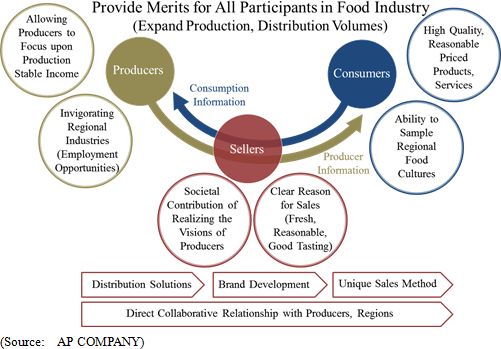  <Business Description>
AP COMPANY identifies the following points as key issues within the food industry which need to be resolved.
◎ Being Conscious of Issues Surrounding the Food Industry ◎ Business Model
With the mission of resolving these issues by "pursuing the ideal vision of food and eating", AP COMPANY seeks to "invigorate primary industries (Agriculture and fishing)", and "raise the quality and reduce prices of products and services provided". At the same time, the Company will integrate the functions of food production (Primary industry), distribution (Secondary industry) and sales (Tertiary industry) by deploying a "producer to seller directly linked business model" as part of the sixth sector industrialization movement.
(*) Sixth Sector Industrialization
"In general, the term sixth sector industrialization refers to efforts to comprehensively promote the primary industry which includes agriculture and fishing, secondary industry which includes manufacturing, and tertiary industry which includes retail services, and leveraging regional natural resources to create new value addition. In the case of AP COMPANY, the term secondary industry is used to describe the distribution services industry. The term sixth sector is derived from the addition of 1 plus 2 plus 3, or the multiplication of 1 by 2 by 3, of the primary, secondary and tertiary industries. Characteristic 1: Creating an In-House Food Production Structure and Collaborting with Regional Producers
In addition to forming direct collaborative relationships with seafood producers and other regional producers with food products that have strong competitive potential, AP COMPANY is also conducting its own in-house production of poultry and cultivation of fish (Chicken farming and processing, fixed net fishing) through subsidiaries established in the local markets. With regards to the traditional distribution structure where numerous wholesale companies operate, opportunities for face-to-face meetings between the actual producers and sellers of food products are few and far between. However, in AP COMPANY's business model, producers and sellers of food products meet directly and there are many opportunities for full- and part-time workers to gain a deeper understanding of the conditions of the food producers. Through these opportunities, AP COMPANY staff are able to gain a stronger understanding of the difficult conditions faced by food producers and the hard work that goes into growing and cultivating food products. In turn, staff can describe the conditions of how the poultry and other food products that are served at AP COMPANY restaurants are grown to customers with confidence. In addition, the food producers can get important feedback on "how, where and by whom the food products they grow and cultivate are consumed" to be used in the production of foods in the future. Characteristic 2: Distribution Solutions
AP COMPANY also proposes solutions to issues in the distribution structure that can lead to a reduction in costs and a shortening of delivery times, allowing for food products to reach end users in fresher condition. Also, processed product solutions are proposed to utilize fish and other products which previously went unused.
(*) Unused Fish
Proposals to utilize fish which are too small for commercial sale, or fish varieties which are unrecognized by consumers as a means of increasing product value and raising income of fishing company operators. Characteristic 3: Brand Creation, Diffusion
With the goal of gaining a better understanding for regional food cultures, specialized food products, food production methods and the philosophies of the food producers, information about the food producing regions and the food products themselves are listed in the restaurant menu books as a means of increasing value addition of the experiences of customers dining at AP COMPANY restaurants. Also, the Company can create an even stronger brand through this deeper understanding of the overall business cycle gained by its participation in the various production processes for foods.
Characteristic 4: Invigoration of the Primary Industry, Regional Economies
Based on the goal of conducting integrated operations spanning food production, distribution and sales to provide food products at appropriate pricing levels and on a sustained basis, AP COMPANY seeks to create a business environment where stable and adequate levels of income are provided to the food producers, which in turn will create new employment opportunities within the primary industries and contribute to invigoration of regional economies.
◎ Business Segments
AP COMPANY's business can be divided into the two main business segments of the production and distribution, and the sales businesses.
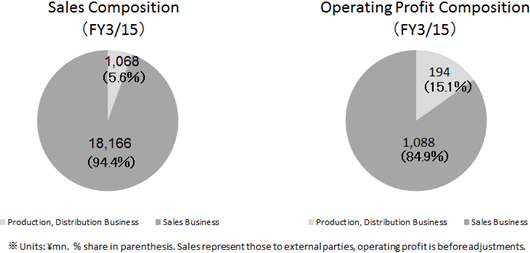 <Production, Distribution Business>
As part of the "direct producer seller channel business model", production and processing of poultry, seafood, fruit and vegetables are conducted. These food products are supplied to AP COMPANY's own directly operated restaurants and to restaurants licensed by AP COMPANY, in addition to sales to restaurants and stores outside of the AP COMPANY Group.
① Poultry Production, Distribution
A subsidiary was established in Nichinan City, Miyazaki Prefecture in 2006 for the production of "Miyazaki Free Range Chicken" at its own farms. In 2007, a processing plant was constructed. And in 2010, a baby chicken center was integrated with the poultry processing plant to establish an integrated manufacturing structure. In addition, this knowhow was leveraged for the start of production and sales of "Shintoku Free Range Chicken" (Hokkaido) from 2011 and "Kuro Satsuma Chicken" (Kagoshima) from 2012.
② Fresh Fish Cultivation, Distribution
By leveraging the "morning catch delivery service" to deliver fish and other seafood which were caught in the morning to restaurants by the same evening, AP COMPANY is expanding the direct transactions between fishermen and fishing cooperatives and end users that do not pass through wholesale markets. A subsidiary called Project 48 Co., Ltd. was established in Nobeoka City, Miyazaki Prefecture in 2011 for the joint operation with the local fishing cooperative of fixed net fishing business. In addition, AP COMPANY acquired a license to participate in fruit auctions at the Ota Market, enabling it to make direct purchases of fruits. In addition, the Company has also established direct channels with fruit farmers across the nation.
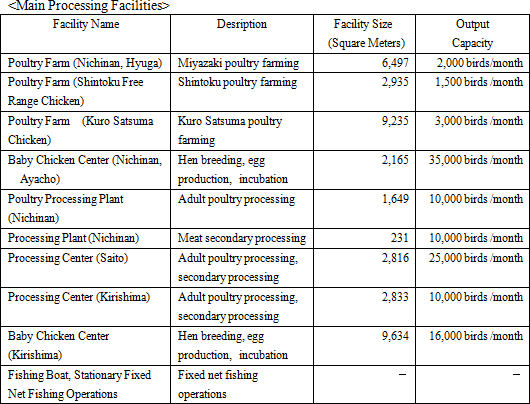 <Sales Business>
The sales business is comprised of the two restaurant brands of "Tuskada Nojo" restaurants that serve free range chickens raised at AP COMPANY's own farms, and "Yonpachi Gyojo" restaurants that serve fresh seafood cultivated by fishermen from around Japan. The average pricing per customer is about ¥4,000 and the restaurants are operated primarily around the Tokyo metropolitan region. Furthermore, it operates home meal replacement stores as part of its sales channel diversification strategy. <Characteristics and Strengths>
The unique sales methods employed at Tsukada Nojo and AP COMPANY's other restaurants are a strong distinguishing characteristic of its unique sales method. Based upon consumer psychology analysis results that show "service that exceeds expectations to provide customers with excitement and satisfaction leads to high repeat ratios by customers", the ability to provide customers with freedom in the service that staff offer to customers within a set budget leads to high repeat business.1. Unique Sales Methods The repeat rate refers to "the number of customers that pay return visits to restaurants relative to the total number of customers visiting the restaurant." (In order to measure the frequency with which customers who become fans of AP COMPANY's restaurants bring friends with them on their return visit, AP COMPANY places a greater emphasis on the number of groups visiting the restaurant.) Some of President Yoneyama's thoughts regarding the unique sales promotion methods used to differentiate AP COMPANY restaurants from his book "Atypical New Restaurants" are provided below. * "Value Addition Provision Talk"
Restaurant staff act on behalf of AP COMPANY to convey the important values of "food producers." AP COMPANY is able to accurately convey conditions and issues confronting food producers to customers because of its own direct participation in the process of food production. It is also this process of conveying information that is considered to be an important "value added service".The conveying of information to customers visiting AP COMPANY restaurants is considered to be an overwhelming differentiating factor and a "reason for customers to visit its restaurants," enabling it to become the "restaurant of choice. Example: This is our speciality, charcoal-grilled free-range chicken. Fresh free-range chicken raised at our company's poultry farm is cooked rare, which is the most delicous degree of doneness. First, savor the delicous flavor of the chicken by itself, and then enjoy it together with our home-made yuzu kosho (a blend of citrus and peppers.) This fish is known as "dark sleeper," and is a famous fish of the Sanriku Coast. Although not well-known in the Kanto region, this delicious fish is a favorite of locals. Enjoy the sublime flavor of fresh dark sleeper that has been simmered. * "Teppan (Iron Plate) Jab"
In order to gain repeat usage of customers, AP COMPANY seeks to provide them with "exciting" experiences and services which they have not experienced at other restaurants. This sales promotion method is known as "teppan (Iron plate) jab" within AP COMPANY. (Jab to knock the customer out with an overwhelmingly exciting experience.) Example: When the menu item called "Jittoko Sumibiyaki" is provided, staff inform customers that the dish should be eaten with "yuzu kosho green Japanese citrus pepper sauce. Staff then inform customers that they should try the dish with red pepper sauce after they have eaten some of the dish. Staff also explain to customers that the "Jitokko Sumibiyaki" it is not designed to be eaten cold. So they then suggest that the dish can re-warmed and eaten with Nichinan citrus vinegar. Once the customer has finished the dish, staff take the hot plate upon which it is served away to be used to cook fried rice using the juices from the "Jittoko Sumibiyaki". The idea of serving the dish with red Japanese citrus pepper sauce in addition to the green Japanese citrus pepper sauce was suggested by a part-time staff. Based upon this idea, product development staff conducted an extensive nationwide search for the best food ingredients to be used for this dish. In this manner, the ideas of our part-time staff have been leveraged to "develop delicious food products to be enjoyed by customers" and are used to provide value added services including the conversations between staff and customers. Restaurant managers create an environment in restaurants where staff can actively propose ideas such as this to create a unique experience that differentiates the restaurants. 2. Training Program
Based upon these sales methods of "value added conversations" and "iron plate jabs", AP COMPANY seeks to "pursue the ideal vision of how the Japanese food service industry should be" as its basic corporate philosophy to be understood and ingrained through training of both its full- and part-time staff. In order to gain the understanding of this philosophy by its staff, AP COMPANY boasts of a unique training program.◎ Endeavors to Diffuse Corporate Philosophy Because there were no staff who were able to lead the training efforts initially, the Company relied upon external trainers to lead its initial training efforts. However, there were some shortcomings in the use of external trainers as most did not have the experiences working in the food industry. In response to this problem, President Yoneyama hired an outside consultant to establish training knowhow within the Company. Currently, AP COMPANY boasts of 33 staff who serve as training leaders. There are limitations as to how far President Yoneyama can diffuse the corporate philosophy, mission, and the goals of AP COMPANY. Therefore restaurant manager class staff have been cultivated to serve as training leader to be able to lead training classes of between 100 to 200 staff. Furthermore, a goal of restaurant staff is to become a training leader. A reason for the enhanced training system of AP COMPANY is its bountiful training materials and the realism of its training based upon the participation in various parts of the food production process. Based upon the "direct producer seller channel business model" and AP COMPANY participation in the primary, secondary and tertiary industries, AP COMPANY seeks to teach its staff about "invigorating the primary industries and regional economies", "resolving issues in the secondary industries", and "the value of life", in addition to techniques to interface with customers. Its training course is also filled with materials designed to establish a sense of empathy amongst its staff. For example, newly hired staff are sent to Miyazaki Prefecture for two to three weeks of training during the third year of work. Free range chickens are prepared for shipment at four to five months after hatching. And at the meat processing plant they are cut into three parts. Many of the staff attending the processing plant cry at the sight of the actual processing of the chickens. Subsequent to this moving experience, they take a much more serious and deeper consideration of the sacrifices needed to provide food to consumers. In turn, these same staff begin to ponder the question of "what exactly is their role in this process", and they gain a new sense of appreciation for animals and plants provided as delicious meals for consumers. Scenes of this training program are recorded to be shown to newly hired full- and part- time staff. Thereafter, staff are taught about their role in restaurants. Through these experiences, newly hired staff are taught the corporate philosophy, vision, and mission. At the same time, they also gain an understanding of the motivation and philosophies of food producers, which are then explained in the course of providing various foods to customers. ◎ Advantages of M&A
This training program is also a vital tool in the strategy of conducting aggressive M&A activities. In order to succeed in M&A, "the ability to discover superior M&A targets" and "implement M&A at appropriate pricing" is an important factor. However, another important factor is the ability to implement effective post merger integration (PMI) in order to extract synergies from any M&A activities.Obstacles to integration need to be validated in the early stages of M&A activities to secure solid integration effects from M&A activities. Furthermore, management structure integration needs to be promoted after M&A is conducted. Consequently, PMI is an important theme that will determine whether or not management can overcome differences in corporate cultures. Normally, employees of companies being taken over in M&A activities generally suffer a decline in motivation. However, in the case of AP COMPANY, the training program plays an important role in "gaining an understanding for and diffusing corporate philosophies" to achieve a common mindset that will help unite the group and mobilize the strengths of both companies. 2. Recruiting Part-Time Staff
While the shortage of part-time workers in the food service industry is severe, AP COMPANY has been far more successful in securing human resources than its competitors. AP COMPANY also endeavors to raise employee satisfaction in addition to customer satisfaction. As part of the hiring process, AP COMPANY places emphasis on whether or not an applicant can gain understanding and empathy for its corporate philosophy and mission. Therefore, the Company conducts "employment support seminars" for potential new part-time staff. Part-time staff are taught about job searching and how to be prepared for work in this seminar. In addition, they are also given referrals to jobs. The fact that job seekers have worked at "Tsukada Nojo" is considered to be a positive factor by other companies considering employment of former AP COMPANY staff, because of its rigorous training program. Consequently both potential workers and other companies seeking to hire former AP COMPANY staff consider employment at AP COMPANY to be a positive.In addition, AP COMPANY also conducts an award program for staff who propose good ideas as a means of increasing overall staff motivation and cultivating skills of each individual staff. This program is highly regarded amongst student workers. These programs allow AP COMPANY to avoid having to raise hourly pay by large margins to attract and hire part-time staff, and they have contributed to a relatively long employment retention period of 1.9 years and stability in its work force. 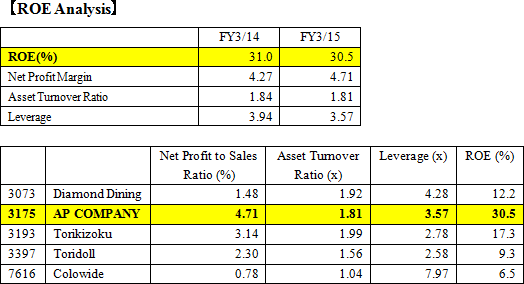 |
| Growth Strategy |
|
<Existing Businesses>
AP COMPANY had a target of 40 new restaurant openings during fiscal year March 2015, but the actual number of restaurants opened fell shy of target by 14 restaurants to 26. As part of its efforts to fortify its new restaurant opening function, the Company headhunted new restaurant opening staff and strengthened its overall human resources capability, dividing the new restaurant development department into two parts to promote more effective new restaurant development activities.
① New Restaurant Opening Structure 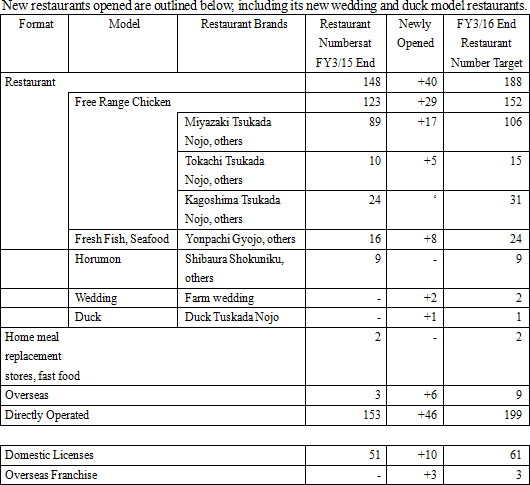 ② Product Development Structure
AP COMPANY staff stationed around the country are dispatched to discover new and interesting food products. These staff stationed locally have access to various food cultures unique to the local regions in which they live and work, and they are constantly gathering information on new food products as part of the process of developing attractive new food menu development.
③ Human Resources Hiring
AP COMPANY seeks to become a "comprehensive food marketing company" based upon its unique sixth sector industrialization business model and to exceed the conventional boundaries of food service by cultivating new business realms. Therefore, it is necessary for the Company to hire staff with the proper mindset and to secure highly skilled human resources as part of its efforts to fortify its overall work force. Furthermore, new business will be started based upon this sixth sector industrialization business model in the realms of food services, electronic commerce (EC), external sales, bento (lunch) boxes, bridal services and in overseas markets as well. At the same time, AP COMPANY will provide diversified career paths to its staff as a means of attracting human resources.
<New Businesses>
In July 2012, a subsidiary called AP COMPANY International Singapore was established. In October of the same year, the first "Bijin Nabe (Japanese Beauty Collagen Hot Pot) Restaurant Tsukada Nojo" restaurant was opened in Singapore. During the coming three years AP COMPANY International Singapore plans to open 16 new restaurants and achieve sales of Singapore $25.00 million (Approximately ¥20.00million). AP seeks to provide authentic Japanese cuisine along with heartwarming Japanese hospitality services. The sale of various foods from around Asia in Singapore will contribute to improvements in incomes of participants in agriculture and promote employment opportunities in agriculture, thereby invigorating the primary industry in Asia.① Accelerate Facility Openings in Asia As of January 1, 2016, AP COMPANY will acquire four restaurants operated by the EN Holdings PTE LTD and its three group companies (Hereafter called EN Group). Along with this acquisition, AP COMPANY will accelerate its restaurant opening strategy in Singapore. In addition, AP COMPANY has signed a licensing agreement with a local company to open three "Bijin Nabe" restaurants in the Philippines, marking a start to the expansion of its operating territory in Asia. ② Restaurants to Open in the United States
AP COMPANY will open authentic Japanese restaurants in the United States, where the popularity of Japanese food is high, to help educate the US consumer market on real and delicious tasting Japanese cuisine. In fall 2015, "Nojo San Francisco" is scheduled to open in San Francisco, and in January 2016 "Tsukada Farm Hawaii" is expected to open in Hawaii. This development also marks the start of AP COMPANY's advance into other markets outside of Asia. As mentioned above, the ability to offer staff opportunities to work in overseas markets is yet another strong point of AP COMPANY's hiring strategy to attract highly skilled staff.
③ Bridal and Wedding Services Started
In September 2015, the French restaurant "Tycoon Continental" was opened in Yokohama to provide wedding after party services. Strengths of the "direct producer seller channel business model" will be leveraged to provide high quality foods at reasonable prices. The provision of usage of existing restaurant facilities for after wedding dinners and parties will be expanded as a means of increasing the utilization rates and earnings derived from existing restaurant facilities.
④ Bento Box Delivery Services
From July 2014, a bento box (Lunch box) delivery service called "Obento Labo" began operations. The strength of product development based upon Tsukada Nojo food menus have been leveraged in this bento box delivery service.
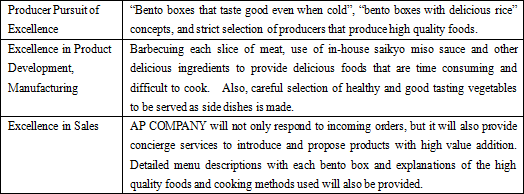 In the future, efforts to fortify processing facilities, expand targeted customers (General companies and BtoC business), and strengthen logistics facilities will be made to expand the delivery area, with sales and operating profit expected to reach ¥3,315 and ¥384 million respectively in fiscal year March 2018. ⑤ External Sales, Electronic Commerce Services
Based upon the bento box delivery service targeting corporate clients, AP COMPANY is also considering the expansion of this service to include external sales to individual users. Also, certain products chosen from the restaurant menu including "Tsukada Nojo Secret Miso Sauce" and "Tsukada Nojo Zukadama Pudding" are being developed as products to be sold outside of the restaurants.
◎ External Sales ◎ Electronic Commerce Service
AP COMPANY is also considering the provision of online sales services for agricultural products. Similar to the delivery bento box service, it is considering the potential to create a brand that leverages the production and sales of its products.
|
| Interview with President Hisashi Yoneyama |
|
<Endeavoring to Become a Comprehensive Food Marketing Company>
<On Deployment of New Businesses>
<Message to Investors>
|
| Fiscal Year March 2016 Earnings Estimates |
 Announcement of a Stock Buyback AP COMPANY announced its plan to undertake a stock buyback amounting to a maximum number of 150,000 shares and a value of ¥260 million as part of its flexible capital strategy to make more effective use of capital. |
| Conclusions |
|
Disclaimer
This report is intended solely for the purpose of providing information, and is not intended as a solicitation to invest in the shares of this company. The information and opinions contained within this report are based on data made publicly available by the Company, and comes from sources that we judge to be reliable. However, we cannot guarantee the accuracy or completeness of the data. This report is not a guarantee of the accuracy, completeness or validity of said information and or opinions, nor do we bear any responsibility for the same. All rights pertaining to this report belong to Investment Bridge Co., Ltd., which may change the contents thereof at any time without prior notice. All investment decisions are the responsibility of the individual and should be made only after proper consideration.Copyright(C) 2016, Investment Bridge Co., Ltd. All Rights Reserved. |

